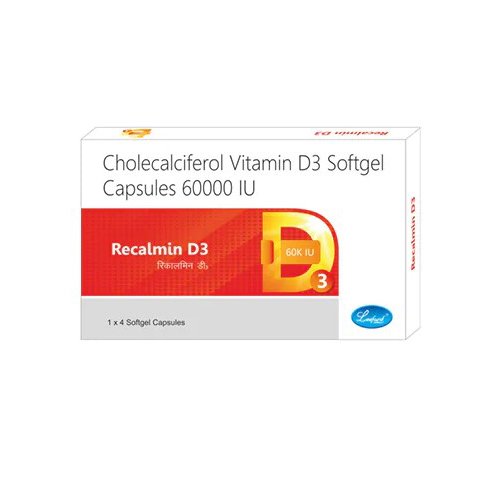Vitamin D3 Capsules – Benefits, Uses, Dosage, Side Effects & Complete Health Guide
What is Vitamin D3?
Vitamin D3 Capsules also known as cholecalciferol, is a fat-soluble vitamin that plays a vital role in maintaining overall health, especially in bone health, calcium absorption, and immune function. Vitamin D3 is the natural form of vitamin D that your body makes when skin is exposed to sunlight (UVB rays).
- Strengths available: Commonly in 400 IU, 800 IU, 1000 IU, 2000 IU, 5000 IU, and 60000 IU
- Form: Capsules, softgels, or tablets
- Route: Oral
Key Functions and Benefits of Vitamin D3:
- Calcium & Phosphorus Absorption
- Enhances the absorption of calcium and phosphorus in the intestines
- Crucial for maintaining healthy bones and teeth
- Bone Health
- Prevents rickets in children and osteomalacia or osteoporosis in adults
- Supports bone mineralization and strength
- Immune System Support
- Modulates immune response
- May reduce susceptibility to infections and autoimmune diseases
- Muscle Function
- Helps with muscle strength and function
- Low levels are linked to falls and muscle weakness in the elderly
- Mood and Mental Health
- Plays a role in mood regulation; deficiency is linked to depression
- Chronic Disease Prevention (Investigational)
- May help reduce risk of cardiovascular diseases, diabetes, and some cancers (research ongoing)
Therapeutic Indications
- Vitamin D deficiency
- Osteoporosis / Osteopenia
- Rickets (in children)
- Osteomalacia
- Hypoparathyroidism
- Chronic kidney disease (CKD)
- Support during pregnancy & lactation
- Immune system support (general health)
Side Effects
Vitamin D3 is generally safe when taken at recommended doses. Excessive intake may lead to vitamin D toxicity (hypervitaminosis D).
Common Side Effects (rare at normal doses):
- Nausea
- Constipation
- Dry mouth
- Metallic taste
Serious Side Effects (due to overdose):
- High blood calcium (hypercalcemia)
- Kidney stones
- Confusion, vomiting, and muscle weakness
Precautions and Warnings
- Monitor blood calcium and vitamin D levels in long-term use or high-dose regimens
- Patients with kidney disorders should use under supervision
- Use cautiously with thiazide diuretics, digoxin, and other calcium supplements
Drug Interactions
- Corticosteroids may reduce vitamin D absorption
- Anticonvulsants (e.g., phenytoin) may increase vitamin D breakdown
- Cholestyramine or orlistat may reduce absorption
- Thiazide diuretics may increase risk of hypercalcemia
Use in Special Populations
Pregnancy & Lactation:
- Generally considered safe in recommended doses
- Supports fetal bone development and maternal health
Children & Elderly:
- Safe and often recommended; dosage should be age-appropriate
Storage
- Store in a cool, dry place, away from direct sunlight
- Keep tightly closed to avoid moisture
Regulatory and Availability Info
- Available over the counter (OTC) in many countries
- Also available by prescription in higher strengths (e.g., 60000 IU)
- Available in capsule, softgel, chewable, and liquid forms







Reviews
There are no reviews yet.